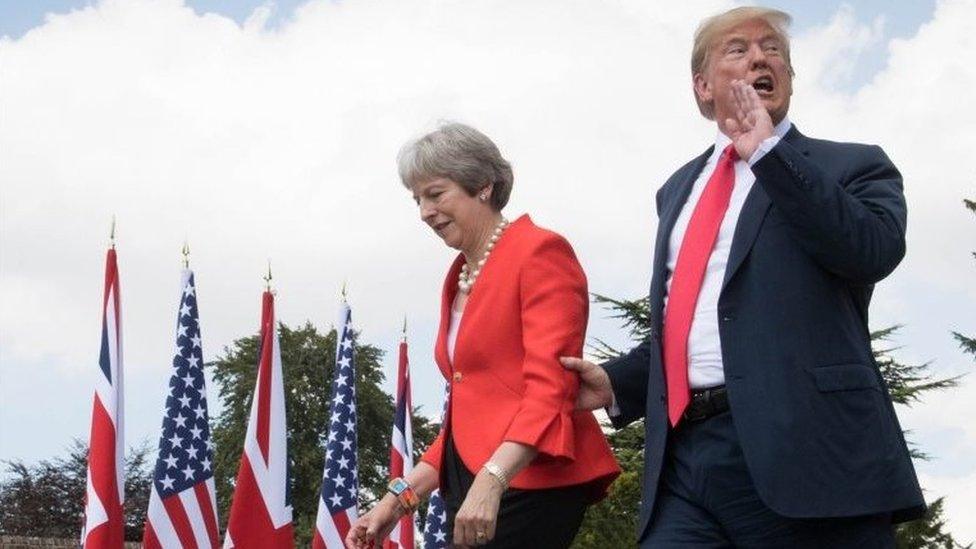Trump praises 'extraordinary' US-UK alliance on state visit
- Published
Theresa May: "Unity of purpose will preserve deep-rooted ties" with US
US President Donald Trump has said the US and UK have the "greatest alliance the world has ever known".
In a news conference with Theresa May, he promised a "phenomenal" trade deal after the UK leaves the European Union, but added that "everything is on the table" - including the NHS.
Mrs May said the scope of trade talks had to be agreed by both countries.
Mr Trump also said he turned down a meeting with Jeremy Corbyn, who addressed protesters in Westminster.
The US president met Brexit Party leader Nigel Farage at the US ambassador's residence, Winfield House, on the second day of his three-day state visit to the UK.
Mr Farage tweeted, external that it was a "good meeting" and Mr Trump "really believes in Brexit".
Mr Trump also said in the news conference:
Mrs May had done "a very good job" in getting the Brexit negotiations to this point and "she's probably a better negotiator than I am"
Brexit "will happen and it probably should happen" because the UK is "a great, great country and it wants its own identity"
Protests against him were "very small" and "fake news"
Both the US and UK are "determined to ensure that Iran never develops nuclear weapons and stops supporting and engaging in terrorism"
The two countries would reach an agreement to protect intelligence sharing, despite their disagreement over Huawei - the mobile internet infrastructure company which the US says is a risk to national security
Conservative leadership candidate Boris Johnson would do "a very good job", as would Foreign Secretary Jeremy Hunt, but he "did not know" Michael Gove

Analysis: The 'end of an era' for May
By James Landale, BBC diplomatic correspondent
Theresa May's news conference with Donald Trump had an "end of era" feel to it.
Only days before she stands down as the Conservatives' leader, the prime minister set out clear positions she hoped may survive her premiership.
On Iran, the UK and US agree on the threat but disagree on the solution, and the US must "do everything to avoid escalation which is in no-one's interest".
On China, she said both sides cannot ignore the threat to their interests, but they must also recognise the country's "economic significance" - a clear warning against a lasting US trade war with Beijing.
On the transatlantic relationship, she emphasised she and the president were only "the latest guardians of this precious and profound friendship".
In other words, she is going and so one day will he, and the relationship will endure.

Protesters gathered in central London and other cities - including Glasgow, Edinburgh and Sheffield - to voice their opposition to President Trump's visit.
Mr Corbyn - who boycotted Monday evening's state dinner - was joined at the rally by members of other political parties, including the Liberal Democrats and the Green Party.
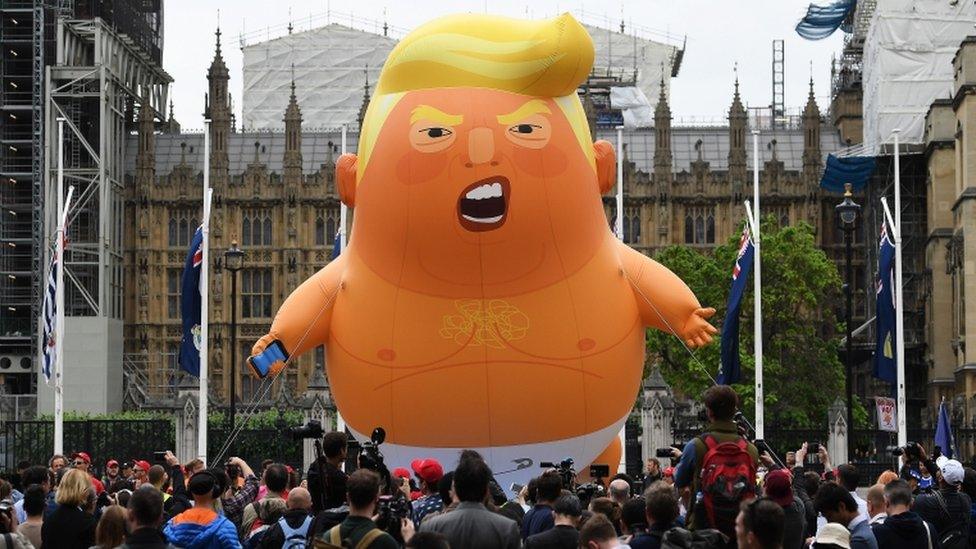
Protesters against the presidential visit launched a Trump baby blimp on Parliament Square
The Labour leader had proposed talks with Mr Trump, with a spokesman saying he was ready to engage with the US president on issues such as climate change, threats to peace and the refugee crisis - but these were refused.
"I want to be able to have that dialogue to bring about the better and more peaceful world that we all want to live in," Mr Corbyn told the crowd of protesters.
Anti-Trump protesters gathered in Trafalgar Square
When asked about the Labour leader, the US president said he did "not know him, never met him, never spoke to him", adding: "He wanted to meet today or tomorrow and I decided I would not do that."
Describing Mr Corbyn as a "negative force", Mr Trump said: "I really don't like critics as much as I like and respect people who get things done."
However, he later told Piers Morgan in an interview for Good Morning Britain that he would have "no problem" with meeting Mr Corbyn another time.

At the protest
By Marie Jackson, BBC News
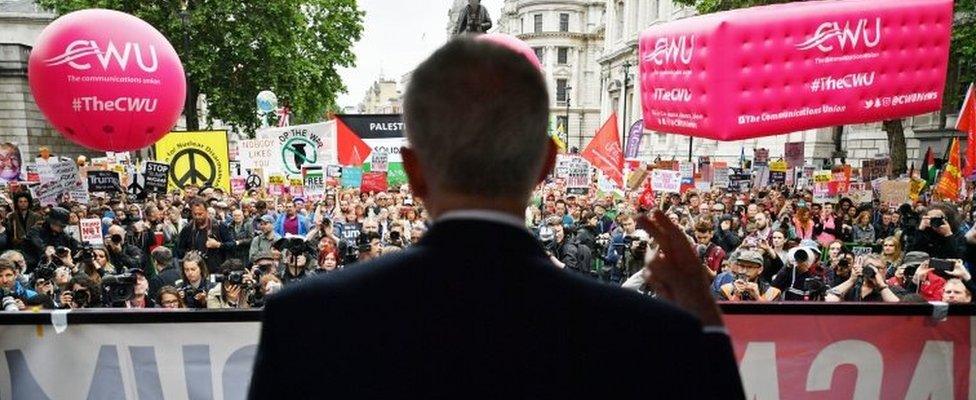
The whistling and whooping ramps up as Labour leader Jeremy Corbyn takes to the stage in Whitehall.
The rainy streets are now packed with cagoule-clad protesters holding aloft umbrellas and placards saying "Dump Trump".
Some have their faces covered with #trumpstinks masks, others wear badges saying "another nasty woman against Trump".
There are mums with small children in buggies who have given up a day in the park to make their young voices heard, alongside seasoned protesters and US expats.
A little further up the street, police officers are dealing with a disturbance by the English Defence League.
The rain's holding off for the moment but Mr Corbyn has a message for the visiting president.
"Think on, please, about a world that is aiming for peace and disarmament, that defeats racism and misogyny."
The crowd roars cheers of support.

Mr Trump also suggested the NHS would be included in post-Brexit trade talks between the US and the UK.
The US president said "everything is on the table" in future discussions between the countries, adding that a "phenomenal" trade deal would be reached.
But Health Secretary Matt Hancock was among several Conservative leadership candidates who said they would not allow the NHS to become part of any trade talks. "Not on my watch," he tweeted, external.
And later Mr Trump told GMB's Mr Morgan that he does not "see it being on the table".
"Somebody asked me a question today and I said everything's up for negotiation because everything is, but I don't see that being... that's something that I would not consider part of trade. That's not trade," he said.
Mrs May said any trade agreement would follow talks about "what should or should not be in that trade deal for the future".
After speaking of the US and UK's "special relationship", she also said the leaders had "openly" discussed their differences, such as on climate change, Iran and China.
The US President promises a post-Brexit trade deal with the UK "two or three times as big as now"

Analysis: What would a US-UK trade deal mean for the NHS?
By Hugh Pym, BBC health editor
There is nothing to stop American or any other foreign firms bidding for NHS contracts under current rules, as long as they have a subsidiary in the EU.
The health reforms in England in 2012 required local commissioners to put large contracts out to tender.
A subsidiary of the US company United Health, along with British firms like Virgin and Circle, is among private groups which has won such contracts.
Around 7% of the English health budget goes to private providers.
There are different contracting arrangements in other parts of the UK.
The head of NHS England, Simon Stevens, has called for new legislation to drop the requirement for health commissioners to put contracts out to tender.
But if the government decides to do this it's not clear whether that might be overridden by the sort of trade deal with the US mentioned today by Mr Trump.
That's the suspicion of those who argue the NHS is vulnerable to covert privatisation.

At the end of a day of meetings with the prime minister and a visit to the Churchill War Rooms, Mr Trump welcomed guests for a banquet at the US ambassador's residence in Regent's Park.
The Prince of Wales and the Duchess of Cornwall attended on behalf of the Queen, along with the prime minister and some members of her cabinet.
During his visit, the US president is expected to meet Tory leadership hopefuls Michael Gove and Jeremy Hunt. He had a phone conversation with Boris Johnson, another candidate.
He also met former Cabinet ministers and Brexiteers Iain Duncan Smith and Owen Paterson.
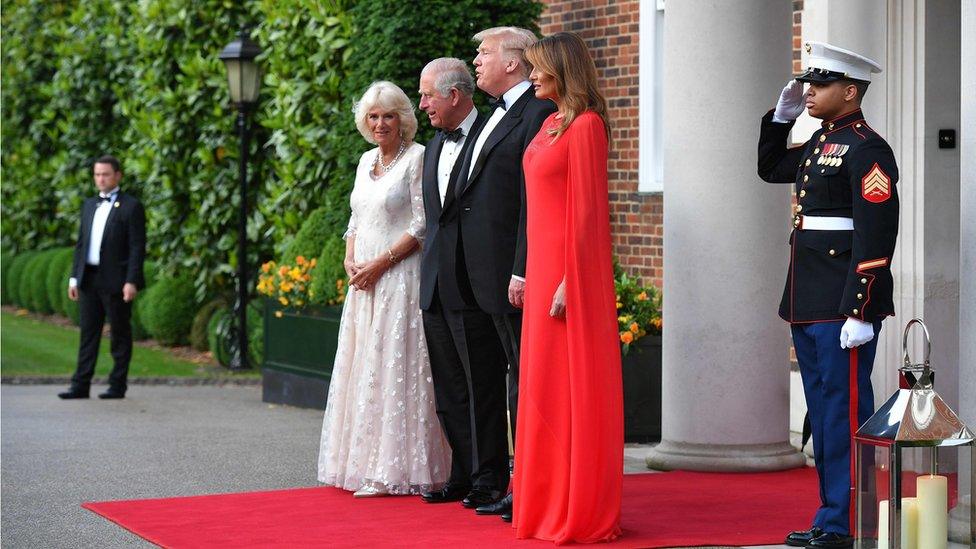
The president and first lady welcomed Prince Charles and the Duchess of Cornwall for a banquet at Winfield House
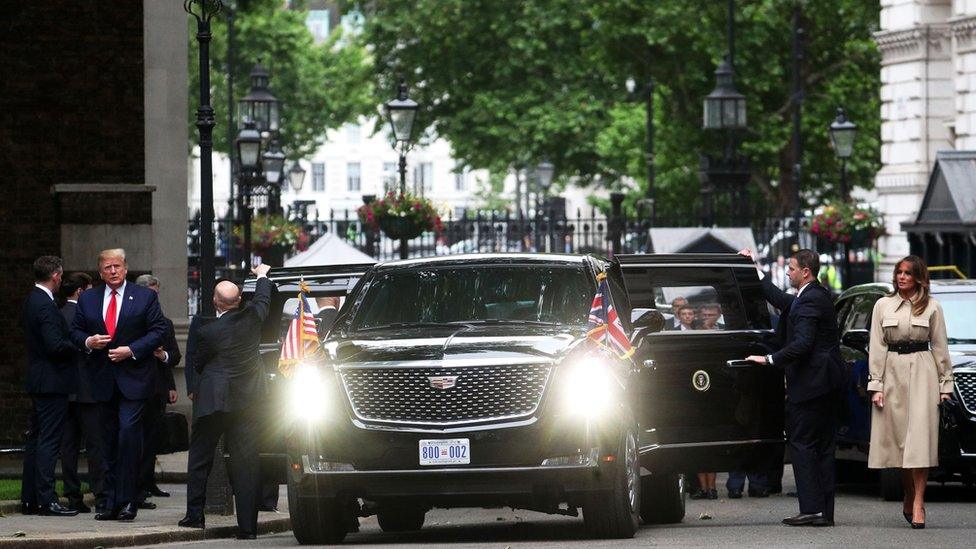
Mr Trump and the first lady were taken to Downing Street in a limousine known as the Beast
The US president arrives for talks with Mrs May at Downing Street
On Monday, Mr Trump was welcomed by the Queen and had lunch at Buckingham Palace with senior royals. He also visited Westminster Abbey and had tea at Clarence House with the Prince of Wales and the Duchess of Cornwall.
He attended a state banquet at Buckingham Palace in the evening, during which Mr Trump praised the "eternal friendship" between the UK and US.
The Queen said the countries were celebrating an alliance which had ensured the "safety and prosperity of both our peoples for decades".
The president's visit coincides with the commemorations for the 75th anniversary of the D-Day landings, which the Queen, Mr Trump and other heads of state will attend at Portsmouth on Wednesday.


Are you following the state visit? Email haveyoursay@bbc.co.uk, external
Please include a contact number if you are willing to speak to a BBC journalist. You can also contact us in the following ways:
WhatsApp: +44 7555 173285
Tweet: @BBC_HaveYourSay, external
Send pictures/video to yourpics@bbc.co.uk, external
Text an SMS or MMS to 61124 or +44 7624 800 100
Please read our terms of use and privacy policy
- Published4 June 2019
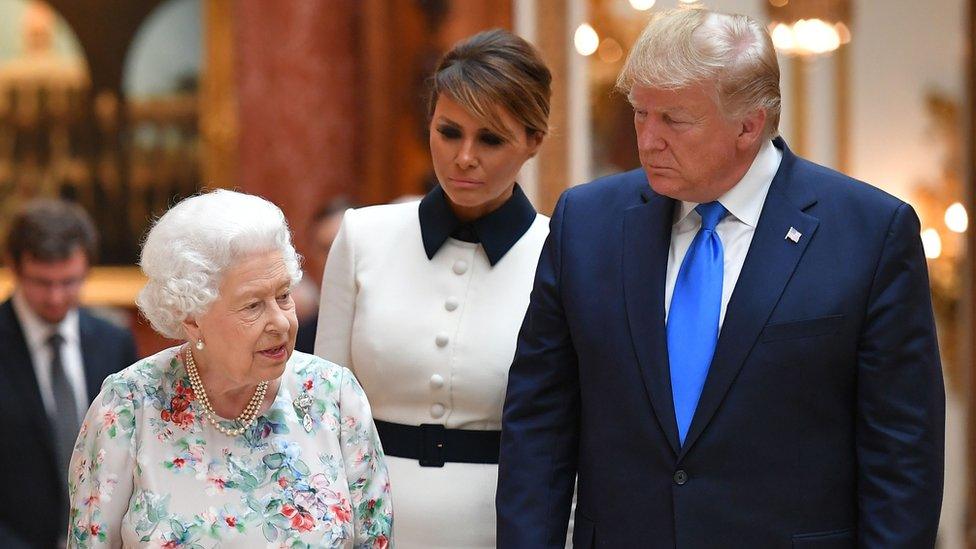
- Published4 June 2019
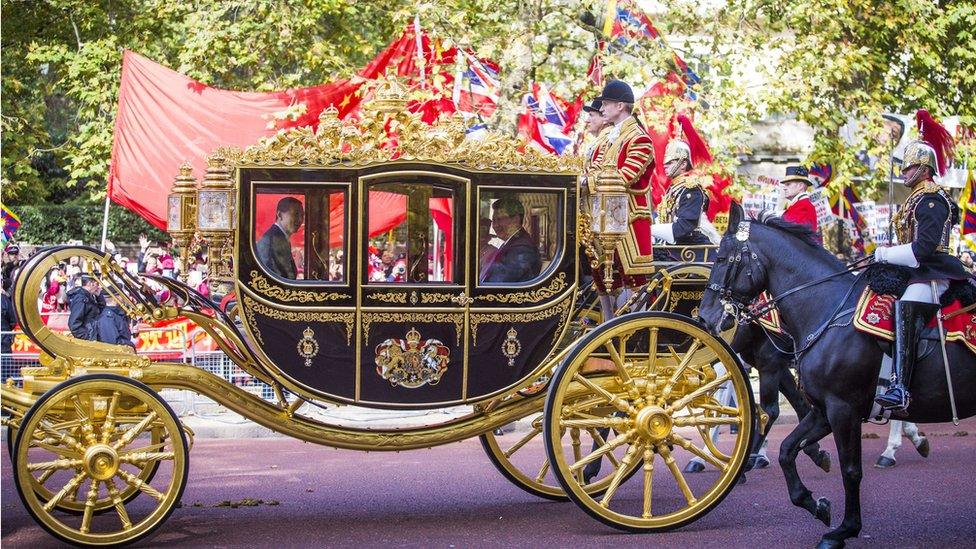
- Published4 February 2019
